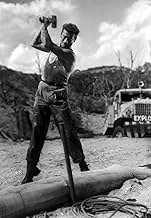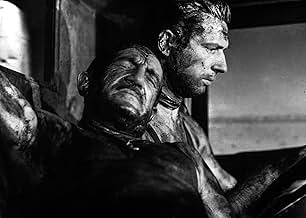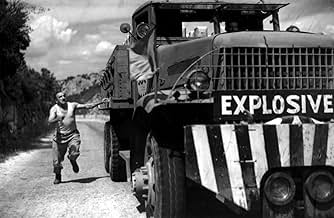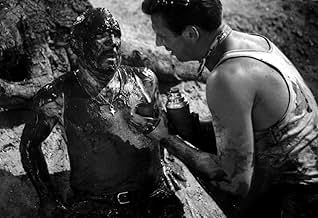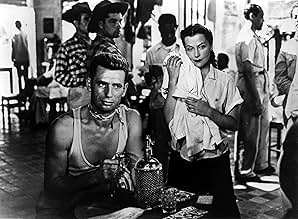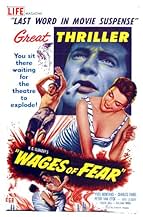Em uma aldeia da América do Sul, quatro homens são contratados para transportar uma remessa urgente de nitroglicerina, mas sem o equipamento de segurança.Em uma aldeia da América do Sul, quatro homens são contratados para transportar uma remessa urgente de nitroglicerina, mas sem o equipamento de segurança.Em uma aldeia da América do Sul, quatro homens são contratados para transportar uma remessa urgente de nitroglicerina, mas sem o equipamento de segurança.
- Direção
- Roteiristas
- Artistas
- Ganhou 1 prêmio BAFTA
- 6 vitórias e 1 indicação no total
Peter van Eyck
- Bimba
- (as Peter Van Eyck)
Véra Clouzot
- Linda
- (as Vera Clouzot)
Darío Moreno
- Pepito Hernandez
- (as Dario Moreno)
Antonio Centa
- Camp Chief
- (as Centa)
Charles Fawcett
- Bradley
- (não creditado)
- Direção
- Roteiristas
- Elenco e equipe completos
- Produção, bilheteria e muito mais no IMDbPro
Resumo
Reviewers say 'The Wages of Fear' is a gripping film about desperation and survival, with intense suspense and masterful direction by Henri-Georges Clouzot. Critics praise Yves Montand and Charles Vanel's performances and the exploration of human resilience. Some find the initial setup slow and criticize the portrayal of the American oil company. Despite this, the film is celebrated for its innovative cinematography and thematic depth.
Avaliações em destaque
In the opening scene of Wages of Fear (1953), director Georges Henri-Clouzot provides an inkling of the kind of claustrophobic ride we are in for. In a steamy, impoverished Latin American town called Las Piedras, insects grope clumsily in the dust, struggling to escape the strings that children have tied to them. People from all over the world congregate in the streets and bars and the air is thick with choking dust. Clouzot makes clear the desperation of the residents, "It's like prison," explains one of them. "Easy to get in, but escape is impossible." The Southern Oil Company (SOC - same initials as Standard Oil) runs the town and enjoys its profits while the villagers are compelled to work odd jobs just to stay alive. After a fire breaks out at one of the oil fields killing many workers, the anti-union American boss seeks experienced drivers from among the townspeople to put out the fire. It is here that the anti-American flavor runs thick and where much of this part of the film was originally excised for American audiences (but has since been restored).
Four men, desperate to escape their trap, agree to drive a truck loaded with nitroglycerine 300 miles over treacherous mountain roads in the hot sun for the sum of $2000 each. Transporting the nitroglycerine for them is a way out of hopelessness -- either through a big paycheck or through sudden death, with the latter appearing the more probable. Though sadly past the point in time when we can still be shocked over gangster capitalism and men selling out for money, the story is nonetheless compelling. The four who are chosen to go on this fool's errand include Mario, a young Corsican played by Yves Montand in a role that brought him widespread attention. He is carrying on an affair with a local servant girl, Linda (Vera Clouzot) who is in love with him. His treatment of her, however, is atrocious and reflects the attitude of the male-dominated society they live in. Also picked to drive one of the trucks is Jo, an aging Parisian small-time crook (Charles Vanel), Luigi (Folco Lulli), an Italian with less than a year to live, and an ex-nazi pilot (Peter van Eyck). This unlikely group will play a cat-and-mouse game with death for the remainder of the film.
Clouzot depicts several incidents that bring the tension to the boiling point. In the first one, the trucks must travel at least 40 mph over a pot-holed stretch of road to prevent the vibrations from setting off the nitroglycerine. The second involves a sharp, narrow turn that requires the trucks to back up onto an unstable, rotten wooden platform causing it to buckle. Almost immediately afterwards, the trucks are stopped by a huge boulder in the middle of the road and must siphon off some of the nitroglycerine to blow it up. Finally, Mario must deftly maneuver the truck over a depression of spilled oil with the wheels stuck in reverse. As the long treacherous journey unfolds, roles are reversed between Mario and Jo as Mario becomes the strong dominant one and Jo, in Charles Vanel's brilliant performance, becomes shaken, fearful, and docile. Their relationship becomes the highlight of the film as the two become mutually dependent on each other for survival and comfort.
I found Wages of Fear to be an involving experience that kept me riveted throughout, though I did sense that there would not be a two and a half-hour film unless somebody survived. Although the unexpected plot twists were gripping, the best part of the film for me was the revelation of each character when faced with fear. It reminded me of the "Treasure of the Sierra Madre", a film that also showed men discovering the truth about themselves and others while pursuing their dream of wealth. Wages of Fear lived up to its accolades, but for me the discordant ending clashed both with the tone of the film and with my experience of the universe not as arbitrary or capricious but as filled with meaning and purpose.
Four men, desperate to escape their trap, agree to drive a truck loaded with nitroglycerine 300 miles over treacherous mountain roads in the hot sun for the sum of $2000 each. Transporting the nitroglycerine for them is a way out of hopelessness -- either through a big paycheck or through sudden death, with the latter appearing the more probable. Though sadly past the point in time when we can still be shocked over gangster capitalism and men selling out for money, the story is nonetheless compelling. The four who are chosen to go on this fool's errand include Mario, a young Corsican played by Yves Montand in a role that brought him widespread attention. He is carrying on an affair with a local servant girl, Linda (Vera Clouzot) who is in love with him. His treatment of her, however, is atrocious and reflects the attitude of the male-dominated society they live in. Also picked to drive one of the trucks is Jo, an aging Parisian small-time crook (Charles Vanel), Luigi (Folco Lulli), an Italian with less than a year to live, and an ex-nazi pilot (Peter van Eyck). This unlikely group will play a cat-and-mouse game with death for the remainder of the film.
Clouzot depicts several incidents that bring the tension to the boiling point. In the first one, the trucks must travel at least 40 mph over a pot-holed stretch of road to prevent the vibrations from setting off the nitroglycerine. The second involves a sharp, narrow turn that requires the trucks to back up onto an unstable, rotten wooden platform causing it to buckle. Almost immediately afterwards, the trucks are stopped by a huge boulder in the middle of the road and must siphon off some of the nitroglycerine to blow it up. Finally, Mario must deftly maneuver the truck over a depression of spilled oil with the wheels stuck in reverse. As the long treacherous journey unfolds, roles are reversed between Mario and Jo as Mario becomes the strong dominant one and Jo, in Charles Vanel's brilliant performance, becomes shaken, fearful, and docile. Their relationship becomes the highlight of the film as the two become mutually dependent on each other for survival and comfort.
I found Wages of Fear to be an involving experience that kept me riveted throughout, though I did sense that there would not be a two and a half-hour film unless somebody survived. Although the unexpected plot twists were gripping, the best part of the film for me was the revelation of each character when faced with fear. It reminded me of the "Treasure of the Sierra Madre", a film that also showed men discovering the truth about themselves and others while pursuing their dream of wealth. Wages of Fear lived up to its accolades, but for me the discordant ending clashed both with the tone of the film and with my experience of the universe not as arbitrary or capricious but as filled with meaning and purpose.
Whoever it may be to rightly claim that he invented the action thriller genre (Méliès, I suppose), Henri-Georges Clouzot's "Le salaire de la peur" is an indispensable milestone on the exciting route to the best films of that kind in the 70's, 80's and nowadays. In its tenseness, as symbolized by the danger of explosion of the lorries' loads, it has hardly been surpassed.
The plot is perfectly worked out from start to end, the leading players act in some of their best parts ever, the (almost) absence of music supports the brutal realism and the consequent choice of authentic outdoor settings contributed a lot to the film's deserved success. Historically, it ranges between neorealismo and nouvelle vague, and yet it is its pure action and suspense that make it worth watching for younger audiences who wouldn't go in for just the artistic way. - Only flaw I can see is the curious, rather artificial change in Vanel's character which has no comprehensible motivation, at least for me whenever I see it.
Apart from that, Clouzot's wife Véra (also well-known from his "Les diaboliques") plays to the "most breathtaking angles" gallery when she bows down to scrub the floor of Dario Moreno's gin joint. It's a man's world after all and there are male perspectives on human survival only. Well, it's existentialism, mates. Altogether, the black and white photography is gripping. The gun scene between Lulli and Vanel is one of the best montages in film history, and there is more excellent editing in "Salaire" (including the finale) that completely fits the hot atmosphere.
The plot is perfectly worked out from start to end, the leading players act in some of their best parts ever, the (almost) absence of music supports the brutal realism and the consequent choice of authentic outdoor settings contributed a lot to the film's deserved success. Historically, it ranges between neorealismo and nouvelle vague, and yet it is its pure action and suspense that make it worth watching for younger audiences who wouldn't go in for just the artistic way. - Only flaw I can see is the curious, rather artificial change in Vanel's character which has no comprehensible motivation, at least for me whenever I see it.
Apart from that, Clouzot's wife Véra (also well-known from his "Les diaboliques") plays to the "most breathtaking angles" gallery when she bows down to scrub the floor of Dario Moreno's gin joint. It's a man's world after all and there are male perspectives on human survival only. Well, it's existentialism, mates. Altogether, the black and white photography is gripping. The gun scene between Lulli and Vanel is one of the best montages in film history, and there is more excellent editing in "Salaire" (including the finale) that completely fits the hot atmosphere.
10barleeku
This movie is astonishing, a gritty story filmed in an ultra-real style that relies simply on the beauty of lighting and film to achieve its stunning effects. It seems from another world, which in a way, it is. The acting is superb: Montand's Mario is full of jerky movements and intense impulses but always maintains his Gallic savoir-faire, while Charles Vanel as Jo brings, at first at least, a type of macho to the screen that modern movie-makers simply do not comprehend. The rest of the cast, especially the camp chief, Luigi, and Peter van Eyck as Bimba are incredible, as is Vera Clouzot who is incomprehensibly but believably upbeat and innocent - and totally gorgeous - in the midst of the hellhole of a town they're all stuck in. Clouzot's directing is flawless - I don't think anyone has ever squeezed more tension with just a few essential scene elements. The trucks wheeze and grunt as well as they ever have in the movies - the only comparison is Spielberg's early gem, "The Duel", but Clouzot's automotive cinematics outdo even Spielberg. The stripped down existentialism of the characters, the starkness of their shared dilemma, the grim and grimy scenery, and the cinematography itself are all of a piece. The latter is what elevates this movie to the very top rank, including some of the most dramatic and effective black and white shooting I've ever seen. Yet it never becomes mannered or gratuitous - it is orchestrated with the rise - and rise! - of tension in the film. The final scene takes on a surreal as opposed to ultra-realistic quality that has its own logic. One last word about the acting - we don't see anything like it anymore. The self-conscious mannerism of method acting (which has had its own triumphs) and the toxic awareness of everyone from the actors to the audience, the camera, directors, etc. that each actor is a celebrity and potential artiste, has ruined that conviction that actors were once larger than life people before they went on-screen, that they came to acting as an outcome of living rough, unadorned, and yet imaginative lives as opposed to shooting for fame and fortune and celebrity within an artificial corporate star-making incubator.
This movie is a true masterpiece in every way! When I rented the DVD and read the story it sounded familiar, because I had watched the newer version before in color with Roy Scheider, which was good as well. But watching the original film truly blew me away. This movie is well made in every detail. It puts a lot of detail-work in the creation of the characters, and once you think that is over and the "regular action-part" starts, it becomes even better and the story takes a 90 degree turn! After I had finished watching the entire movie, I needed at least 5 minutes just to "digest" it and rethink this fantastic film. If you got a chance to watch it, don't miss it! It is entertaining from the first to the last minute!
Clouzot rarely gets the attention he deserves. He made not one, but two of the greatest thrillers of all time, 'Les Diaboliques' and 'The Wages Of Fear', both perfect examples of how to make genuinely suspenseful movies that build up an amazing amount of tension. Most so-called thrillers made in Hollywood these days are thrillers in name only and could learn a lesson or two from these movie classics. 'The Wages Of Fear' could even be described as an action movie, but it is a CHARACTER DRIVEN action movie, and that's what makes it so special. Modern audiences with MTV attention spans might find the plot a little slow, but I think the first half of the movie, which deals with the motley collection of exiles in a poor Latin American town, is not only fascinating in itself, but really makes a massive impact on the second half. By taking his time introducing the characters and exploring their relationships and possible motivations, Clouzet adds depth and meaning to the rest of the exciting story, something very rarely achieved in this type of movie since. The cast, every single one of them, are flawless. The four leads, Mario, the fairly decent guy played by yves Montand, his new best friend the shifty M. Jo (Charles Vanel), his old pal the kind hearted Luigi (Folco Lulli), and the enigmatic Bimba (Peter van Eyck), are all brilliant. Great performances, taut and imaginative direction, crisp and impressive cinematography, and a handful of the most riveting sequences ever committed to film make 'Wages Of Fear' a truly unforgettable experience. Suspense movies don't come much better than this! Simply a masterpiece.
Você sabia?
- CuriosidadesYves Montand and Charles Vanel both suffered from conjunctivitis after filming in a pool of crude oil and being exposed to gas fumes.
- Erros de gravaçãoWhen Bimba is shaving in the cab of the truck, he has the right side of his face covered in shaving cream, but when he turns to talk to Luigi the right side of his face is clear of shaving cream.
- Versões alternativasThe film was cut for U.S. distribution in 1954, in part due to scenes that denounced crooked U.S. business interests in Latin America. The Criterion Collection laserdisc restored the film to its uncut version with 21 minutes of footage removed from other versions of the film.
- ConexõesFeatured in Montand à la rencontre de Pagnol (1986)
- Trilhas sonorasThe Blue Danube
Composed by Johann Strauss
Principais escolhas
Faça login para avaliar e ver a lista de recomendações personalizadas
Detalhes
- Data de lançamento
- Países de origem
- Idiomas
- Também conhecido como
- El salario del miedo
- Locações de filme
- Empresas de produção
- Consulte mais créditos da empresa na IMDbPro
Bilheteria
- Faturamento bruto nos EUA e Canadá
- US$ 21.228
- Fim de semana de estreia nos EUA e Canadá
- US$ 7.633
- 1 de dez. de 2024
- Faturamento bruto mundial
- US$ 22.326
- Tempo de duração2 horas 36 minutos
- Cor
- Proporção
- 1.37 : 1
Contribua para esta página
Sugerir uma alteração ou adicionar conteúdo ausente

![Assistir a Trailer [English SUB]](https://m.media-amazon.com/images/M/MV5BNWU5Zjk4MDAtZDM1Ni00YzJmLTkyZTUtYjVhN2VjNzZmOGVhXkEyXkFqcGdeQXRyYW5zY29kZS13b3JrZmxvdw@@._V1_QL75_UX500_CR0)
